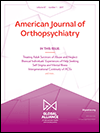IBCCES is the global leader in training and certification for healthcare professionals, educators and corporate partners who work with individuals with autism and other cognitive disorders. Our reach extends to more than 2 million people in all 50 states and over 70 countries around the globe. IBCCES Member Learning Community is provided as a free service to all IBCCES members who have completed one or more of our training and certification programs.
Mental health implications of the acting white accusation: The role of cultural betrayal and ethnic-racial identity among Black and Latina/o emerging adults.
 This post was originally published on this site
This post was originally published on this siteThe “acting white” accusation (AWA) is a cultural invalidation commonly experienced by people of color that challenges their ethnic-racial authenticity for demonstrating behaviors that are not traditionally associated with their ethnic-racial group. Prior research shows that the AWA has negative implications for mental health and ethnic-racial identity (ERI). Cultural betrayal trauma theory also suggests that harmful events perpetrated by ingroup members have unique harm due to the violation of (intra)cultural trust. Prior research has yet to examine the distinct mental health implications of the AWA from ethnic-racial ingroup versus outgroup perpetrators. The present study examines this gap in the literature using longitudinal data and investigates whether ERI centrality moderates the relationship between AWA perpetrators and mental health outcomes. Emerging adults (N = 401; 43% Black, 57% Latina/o; 65% female) were recruited upon enrollment at five predominantly White universities in the Midwest U.S. and surveyed multiple times over their first year of college. Results indicated that AWA insults from ethnic-racial ingroup members were associated with more severe mental health outcomes (greater anxiety and depressive symptoms). Further, ERI centrality provided a protective buffering effect that reduced depressive symptoms, but this effect only occurred for students who received the AWA from White perpetrators and ERI centrality was not protective against AWA insults from ingroup perpetrators. Study findings highlight that specific AWA perpetrators and a person’s level of ERI centrality should be taken into consideration when determining the best strategies for helping Black and Latina/o college students cope with cultural invalidations. (PsycInfo Database Record (c) 2022 APA, all rights reserved)